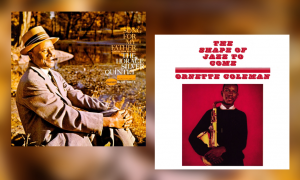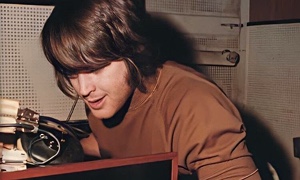Home » Jazz Articles » Building a Jazz Library » Ron Miles: The Best Of The Denver Jazz Doyen
Ron Miles: The Best Of The Denver Jazz Doyen
After a string of fine albums, flanked by Bill Frisell, Jason Moran, Thomas Morgan and Brian Blade, it seemed as though Miles was about to enter a golden period in his career on the Blue Note Records label. Sadly, it wasn't to be. Miles passed away on March 8, 2022, having suffered from polycythaemia vera, a rare form of blood cancer.
In an industry fuelled by reissues, historical box sets and "long lost" live recordings, more music from Miles may well see the light of day down the line. But if not a single further note emerges from the vaults, then no matter, for Ron Miles left a wealth of music that will likely only grow in stature.
 The Ron Miles Trio
The Ron Miles TrioDistance for Safety
(Prolific Records)
1987
Ron Miles' leader debut is a surprising, punchy musical statement. Far removed from Miles' later music—no chord changes or deft harmonics here—it reflects, in many ways, the vibrant and progressive Denver scene that nurtured him.
In late '84, Miles, bassist Mark Simon and drummer Mark Fuller came together in the Bruce Odland Big Band, an important incubator for up-and-coming Denver musicians. Thereafter, the three played in various local groups—Jazz Worms, Kim Stone, Legacy of Sorrow and Big Foot Torso. The chemistry between them, not surprisingly, is pronounced.
An acoustic trio, essentially, it may be, but the musicians tap into other influences, playing with punkish energy on "Mind Police," where Simon's churning ostinatos and Fuller's propulsive rhythms draw fesity open-bell and muted improvisations from the leader. Free improvisation and slow-burning blues come together like tributaries into Miles' rushing torrents on "Apart from you Master." And if the motif on the barnstorming "Whoring With my Pants On" sounds familiar, that is because it harkens back to proto-rock 'n' roll. Miles, in fact, called this tune 'Bo Diddley in 3/4' though there is an altogether more anarchic spirit at play here.
Co-producer Bob Drake leaves his very personal stamp on the brooding "Oh My," his electric bass and pedals infusing a droning, almost menacing, sci-fi ambiance on a tune of coiled tensions. "Sexual Sonata" features The Boulder Creative Music Ensemble: tenor saxophonist Fred Hess; soprano saxophonist Glenn Nitta; alto saxophonist Mark Harris; pedal steel guitarist Glenn Taylor; trombonist Wade Sanders; Mark Richardson and Miles on trumpets. Its bristling polyphonic abstractions and ritual percussive accents could have come straight out of the Art Ensemble Of Chicago's repertoire.
"New York is Not America" is a genre-elusive journey through pulsing acoustic and electronic rhythms, lyrical and angular improvisations. As the title intimates, it is also Miles' tribute to the creativity of his beloved stomping ground of Denver, Colorado.
Distance for Safety is as vital as it is unpredictable. It is like no other album in Miles' discography and, as such, represents an essential entry point in understanding his roots.
 Ron Miles
Ron MilesWitness
(Capri)
1990
What a difference a couple of years can make! Ron Miles' sophomore release was also his first on the Capri label of jazz proselytizer Thomas Burns, who had also recorded the likes of Louie Bellson, Grachan Moncur III, Ray Brown and Phil Woods. Miles is joined by pianist Art Lande, bassist Ken Walker, former Ray Charles drummer Bruno Carr and saxophonist Fred Hess—an important early mentor to the trumpeter.
Miles pays tribute to several heroes. A brushes-steered reading of Thelonious Monk's "Ugly Beauty" is taken at a gently swinging pace, with Hess—on flute—and Miles taking beguiling solos that gather momentum. Miles internalized Duke Ellington's music during time spent touring with Mercer Ellington's Orchestra, and his playing on Billy Strayhorn's "A Flower Is A Lovesome Thing" is tender, bluesy and tinged with melancholy, hinting at Miles Davis' influence. The quintet absolutely smokes on Charles Mingus' "Pithecanthropus Erectus," which toggles between free-jazz sturm und drang and irrepressible swing.
There are two Miles originals. The uplifting title track, propelled by Carr's martial tattoo, sees fines solos from Lande and Miles, but it is the sunny melodic motif that lingers long after the album is back in its sleeve. The boppish head of "Just Like You (Don't Want To Be)" is a smoke screen for a curiously episodic narrative of dramatic shifts in tempi and the freest playing of the set. Hess's cheery "Our Time," most definitely bop-inspired, features the composer on flute and Miles on muted trumpet.
Fine individual and collective playing, and early signs of Miles' embrace of modern jazz vocabulary.
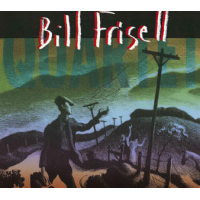 Bill Frisell
Bill FrisellQuartet
(Nonesuch) 1996
"He's the greatest musician I've ever played with," Miles said of Bill Frisell in a 2020 interview with All About Jazz. "To be on the bandstand with somebody who has such a voice on an instrument that we thought you couldn't have a voice on anymore because it had all been done before, but then this person shows up and you hear one note and you know who it is." As with most musicians who have come into Frisell's orbit, Miles was deeply impressed by the guitarist's approach to music.
Quartet was Miles' first recording with fellow Denver High School alumnus Frisell, and marked the beginning of a fertile twenty-five-year collaboration. Frisell is one of the most significant influences in Miles' trajectory, signposting a way for the trumpeter to refine his sound and vision, to make every note count and to think beyond the instrument's traditional role.
Quartet is also a lesson in ensemble playing without solos, to the point where violist/tubaist Eyvind Kang, trombonist Curtis Fowlkes, Miles and Frisell 'sing' together like a choir. In unison passages, particularly those between Frisell and Miles on the blues "Convict 13" their sound becomes something other than the individual parts.
You can draw a line from Miles Davis to Ron Miles on the miniature "Prelude"—where the latter's aching melancholy evokes the dreamy segment of "Right Off" from Davis' Jack Johnson (Columbia, 1971)—and on the brooding "The Gallows," where the Denver trumpeter's mute conjures the noirish atmosphere of Davis' soundtrack to Louis Malle's film Ascenseur pour l'échafaud (Fontana, 1958). On the chamber-esque "Twenty Years" and the pretty "Egg Radio," by contrast, Miles' warm, vibrato-less tone is very much his own.
Quartet is another manifestation of Frisell's singular, all-encompassing vision, but just like the wonderful Blues Dream (Nonesuch, 2001) that followed, it would be difficult to imagine without Ron Miles.
 Ron Miles
Ron MilesRon Miles Trio
(Capri)
1999
Twelve years elapsed between Ron Miles' first trio recording—his debut, Distance for Safety—and his next, which is perhaps surprising given how he so obviously revels in such a context. Here, Miles hooks up with bassist Kent McLagen and pianist Eric Gunnison, Denver stalwarts both, on a set of originals that are teed up for extended improvised passages.
Melody is key to Miles' concept on compositions that feel like sketches open to group interpretation. And whilst there is plenty of individual freedom to stretch out, and a relative openness of form, this is not untethered free-jazz per se—the musicians are too attuned to each other and to the guiding melodic currents. It is one of the album's strengths, particularly on longer pieces like the eleven-minute "Alarm" and the whopping nineteen-minute "Darken My Door," that the trio's interactions feel at once uninhibited yet intensely focused.
Gunnison, who had played for two years with Carmen McRae, informs the music greatly with his silky impressionism—his comping deft yet engaged at every moment, his soloing elegant and unhurried. McLagen's playing is economy exemplified, his earthy tone more felt than heard at times, though his inventiveness, notably on the urgent "Bookworm" and the Bill Evans-esque ballad "Will You Marry Me? makes him an equal partner in the trio's narratives.
Pianist and bassist also convey rhythmic impetus, though it is rarely overtly stated. Miles is on sparkling form, tender and introspective at one extreme, expansive and bullish at the other. On the delicate "Lullaby," his muted trumpet sound has a fragile, distant quality, like an old 78rpm heard through an open window. The old folk tune "Wildwood Flower," popularized by The Carter Family, is a vehicle for his warm, unembellished lyricism. And when the mood takes him, there is a fearless avant-garde streak to his voice.
An excellent example of Miles' dexterity on the trumpet, and a fine showcase of empathetic trio interplay.
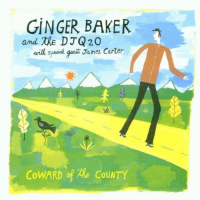 Ginger Baker And The DJQ20
Ginger Baker And The DJQ20Coward of the County
(Atlantic)
1999
Though nominally Ginger Baker's band, Coward of the County is effectively Ron Miles' baby in everything but name, the trumpeter having written six of the eight tunes, which he co-produced with the former Cream drummer. The back story goes like this: Baker spent half a dozen years in the '90s in Parker, Colorado, where he and his wife, Karen, founded the Mile High Polo Club. If Baker was determined to stay clean from the Class A drugs that had plagued him in the '60s and '70s, then the appointment of Hunter S. Thompson as a club director was, if nothing else, a brave one. Ron Miles was another director of the polo club. Strange bed-fellows indeed. The DJQ20 would gig in the polo club after a match.
But it is all about the music, and what great music it is. Baker's Denver Jazz Quartet to Octet (DJQ20) was tenor saxophonist Fred Hess, bassist Artie Moore, pianist Eric Gunnison, organist Shamie Royston, guitarist Todd Ayers, Miles and special guest James Carter, whose baritone saxophone and bass clarinet weave deep, bluesy threads on several tracks. Baker swings throughout, but his is a subtly refined presence.
On the infectious "Cyrille Davis" Baker remembers the English blues harmonicist, with blues solos of contrasting character from Miles (understated beauty), Carter (bruising muscularity) and Gunnison (dancing lyricism). Miles and Hess boss Baker's other composition, the boppish burner "Dangle The Carrot," with meaty solos unfolding over a fast-walking bass and animated drumming.
But it is the six Miles compositions that are at the heart of the album. The trumpeter's balladic finnesse is to the fore on the quartet feature "Megan's Waltz." Layered time signatures create a vibrant tug of war on the cantering "Ginger Spice," where Ayer's riffing suggests West African rhythms. "Jesus Loves You," for octet, shifts from mid-'60s small-group swing to free-jazz skronk. A subtle key change affects the gorgeous title track, colored by shimmering organ, and country-ish pedal steel guitar. Acoustic jazz and grungy guitar-driven fusion co-exist on the powerful "Daylight." Miles sits out "Jesus, I Just Want to Go To Sleep," a shimmering gospel-blues feature for Carter on yearning bass clarinet.
Baker stated that Coward of the Country was one of the best albums he ever made. It is certainly one of the best albums Ron Miles ever made.
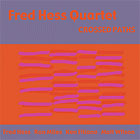 Fred Hess Quartet
Fred Hess QuartetCrossed Paths
(Tapestry)
2005
Saxophonist/bandleader Fred Hess was by all accounts an important mentor for Ron Miles, who first sat in with Hess's Boulder Creative Music Ensemble aged nineteen. Here, Miles was introduced to Hess's graphic notation and structured improvisation, the music of Anthony Braxton and Roscoe Mitchell. Those influences, the tensions between structure and freedom, imbue the music on Crossed Paths—a beautifully adventurous, visceral and often playful album. This was the second album with the line-up of Hess, Miles, drummer Matt Wilson and bassist Ken Filiano following The Long and Short of It (Tapestry, 2004).
Intros, outros and many points in between feature Hess and Miles in knotty unison, their horns weaving in and out of each other's slipstreams. Filiano is the quartet's secret weapon, straddling a high-wire between locked-in rhythm partner of the unobtrusive Wilson, and front-line adventures with Hess and Miles. The bassist's lithe ostinatos and grooving improvisations are a joy. Incidentally, the sound quality of this album is so good that you can hear Filiano breathing during his solo on the Ornette Coleman-esque "Funhouse."
Solos are abundant, though extensions of, rather than wild excursions from, the heads. Hess and Miles are in terrific form and it's fascinating to hear their contrapuntal interplay. Fun too, their to-and-fro on "The Clefs Visit Grandma's," a powerful study in abstraction and no-holds-barred freedom, which sounds like a dog and cat scrapping. One of Hess's finest records, Crossed Paths is also a great showcase for Miles, with half a dozen solos of marked contrasts. They demonstrate, perhaps better than on any album up to this point, Miles' technical proficiency, his emotional range and his ability to play in and out.
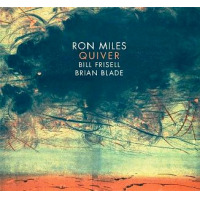 Ron Miles
Ron MilesQuiver
(Yellowbird)
2012
A unique entry in Ron Miles' discography—no bass, no piano, no horns. But when your guitarist and drummer are as agile as Bill Frisell and Brian Blade, you can take the music any which way, and they do, delivering a vibrant lesson in the roots and branches of 20th century jazz.
Partly recorded in the studio, partly recorded live at Denver's Dazzle Jazz Club, six Miles originals handsomely convey the trumpeter's distinctive compositional hallmarks, from beautifully melodic ("Queen B," "Guest of Honor") and bluesy ("Just Married") to episodic, three-way open dialogues ("Bruise") where Miles juxtaposes intense collective motion with looser-limbed freedoms to captivating effect. Seriousness and playfulness go very much hand in hand, particularly on Duke Ellington's Cotton Club-era "Doin' The Voom Voom," which set a benchmark for happy songs that no Disney tune has yet matched.
Fascinating too, the trio's interpretation of the Oscar-winning Henry Mancini/Johnny Mercer song "Days of Wine and Roses," so spare, tender and spacious. A little West African blues enters Frisell's playing towards the end, a trait that also imbues his ever-inventive comping-cum-soloing on Fred Fischer's "There Ain't No Sweet Man Worth the Salt of my Tears"—another standout track.
Except for the odd pocket of space where one musician drops out, it would take an effort to focus solely on one instrument, as all three carry equal weight, pushing and pulling, asking questions of each other and revelling in the joy of communal music making.
 Ron Miles
Ron MilesI Am A Man
(Yellowbird)
2017
Inspired in equal measure by the civil rights movement past and present, art and spirituality, Miles leads a crack band featuring Bill Frisell, Thomas Morgan, Brian Blade and Jason Moran, on a set of characteristically fresh originals, finely structured yet free-spirited, that mark a high-watermark in Miles' trajectory.
Miles' strengths as a composer and band leader are to the fore here, harnessing these outstanding musicians' individual personalities to often epic effect. From the melodically bright yet feisty title track and the swinging "The Gift That Keeps On Giving" to the plaintive "Mother Juggler" and the broodingly intense "Is There Room In Your Heart For a Man Like Me," the music traverses broad expanses of mood and tone. The blues is a frequent though sometimes ghostly companion, while the playful bounce of Thelonious Monk inhabits a couple of tracks. More avant-garde tendencies also filter through, particularly on Miles' more outré soloing and in Frisell's soundscaping at the tail end of the set closer. Dissonance, however, is artfully navigated on these hypnotically unfolding narratives, with beauty ultimately shining through like a beacon of optimism. A deceptively deep, uplifting album.
 Ron Miles
Ron MilesRainbow Sign
(Blue Note)
2020
Ron Miles' first album for Blue Note was his last as leader before his passing. The same band that recorded I Am A Man reconvenes on album of great personal resonance for Miles, who wrote the music during his father's final days. A poetic manifesto for racial tolerance, Rainbow Sign is also a reflection on mortality and love.
In an interview with All About Jazz, Miles gave an insight into his group's approach to the music: ..." the album that I probably listened to the most getting ready for this album was [Thelonious Monk's] Monk's Dream with Charlie Rouse, because so much of this album deals with the way we play together. On Monk's Dream they're playing familiar songs but the way they play together is always so unique and so in-the-moment. This idea of not really playing solos per se has been really influential on us."
Of course, there are solos, notably on the epic sixteen-minute opener, "For Those Who Dream," where Miles, Frisell and Morgan all shine with bluesy improvisations. The album's many charms reside just as much in its aching melodic lines and quietly insinuating vamps, no more so than on the pastoral "Queen of the South" and set-closer "A Kind Word," two of the prettiest tunes ever to come from Miles' pen.
Monk's long shadow falls on the boppish "Binder," while shades of noirish Miles Davis color Miles' muted ruminations on "This Old Man." But these more overt influences aside, the music bears Miles' wholly distinctive stamp of collective coherence allied to individual freedom, thrillingly so on "Custodian of the New," where Moran comes into his own.
The pianist was unavailable for the initial recording date, but rather than bring in a replacement Miles opted to wait, anxious to keep together the group he called his "Mount Rushmore of musicians." Rainbow Sign is a fine monument to Miles himself—a crowning glory in the trumpeter's career.
 Jazz Worms
Jazz WormsSquirmin'
(Capri Records)
2021
Thirty-four years elapsed between Jazz Worms' debut album, Crawling Out (Van Bueren, 1987) and its sophomore release—surely a record of some sort. Formed in Denver in 1984, the quintet's name is an anacronym of the first letters of each member: pianist Andy Weyl; saxophonist Keith Oxman; drummer Paul Romaine; cornetist Ron Miles; and bassist Mark Simon. The hairlines may have receded in the long interim, but the band's playful joie de vivre remains firmly intact.
In truth, it doesn't sound much like a Ron Miles album, and for good reason. This is the only album on this list for which Miles did not contribute to the writing—otherwise shared among the other members. Still, his voice is unmistakable, with a slew of fine solos both muted and open-bell on music that draws principally from hard bop and swing. Miles forms a simpatico front line with Oxman, notably in their cut-and-thrust on "Bu's Box," but it is their unison lines that in large part define the band's sound.
From the catchy opener "Launching Pad," driven by Simon's terrific ostinato, to the hard-swinging, bluesy closer "The Chimento Files," groove and melody are the twin engines that drive the music. The brushes-steered "Balladesque," the set's lone slow number, features fine solos from Miles, Oxman and Weyl—a refined and lyrical presence throughout—but in the main, Jazz Worms music is fired by walking bass grooves, bluesy solos and the spirit of Horace Silver, Art Blakey's Jazz Messengers... and Denver, Colorado.
Tags
Building a Jazz Library
Ron Miles
Ian Patterson
United States
Colorado
Denver
Bill Frisell
jason moran
Thomas Morgan
Brian Blade
Mark Simon
Mark Fuller
Fred Hess
Glenn Nitta
Mark Harris
Glenn Taylor
Wade Sanders
Mark Richardson
Art Ensemble of Chicago
Louis Bellson
Gracan Moncur III
Ray Brown
Phil Woods
Art Lande
Ken Walker
Ray Charles
Bruno Carr
Thelonious Monk
duke ellington
Mercer Ellington
Billy Strayhorn
Miles Davis
Charles Mingus
Eyvind Kang
CURTIS FOWLKES
Ken McLagen
Eric Gunnison
Carmen McCrae
Bill Evans
Artie Moore
Shamie Royston
Tod Ayers
James Carter
anthony braxton
Roscoe Mitchell
Matt Wilson
Ken Filiano
Ornette Coleman
Charlie Rouse
Andy Weyl
Keith Oxman
Paul Romaine
Horace Silver
Art Blakey
PREVIOUS / NEXT
Support All About Jazz
 All About Jazz has been a pillar of jazz since 1995, championing it as an art form and, more importantly, supporting the musicians who make it. Our enduring commitment has made "AAJ" one of the most culturally important websites of its kind, read by hundreds of thousands of fans, musicians and industry figures every month.
All About Jazz has been a pillar of jazz since 1995, championing it as an art form and, more importantly, supporting the musicians who make it. Our enduring commitment has made "AAJ" one of the most culturally important websites of its kind, read by hundreds of thousands of fans, musicians and industry figures every month.












